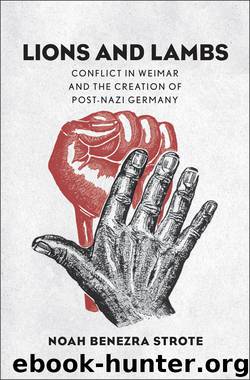Lions and Lambs by Noah Benezra Strote

Author:Noah Benezra Strote
Language: eng
Format: epub
ISBN: 9780300219050
Publisher: Yale University Press
THE (CONDITIONAL) SUPPLY OF CATHOLIC CHURCH SUPPORT
True to the laws of the market, the Catholic supply of support for Erhard’s policies came with a price. Following the market reforms of 1948, the German church hierarchy sought to leverage its new power—with over fifty percent of the Catholic population reporting regular church attendance, this was a substantial influence—to pressure the CDU/CSU leadership to ensure passage of legislation in accordance with Catholic principles.34 Already in August 1948, on the occasion of remembering the patron saint of Germany, Saint Boniface, Germany’s bishops publicly criticized the Economic Council’s lack of social policies to counteract the spike in poverty caused by the deregulations. “We want to think and hope that in the economic reform, the calculation of the bureaucrat does not wipe the slate clean, and instead that suffering people, too, will be accounted for,” read the pastoral letter they circulated to the dioceses.35 Calls for Erhard’s resignation in the CDU/CSU’s Catholic wings showed that these warnings were serious—serious enough to persuade Röpke to appeal to Nell-Breuning for continued support for Erhard and the neoliberals.
Nell-Breuning was Catholicism’s most respected thinker in West Germany. Not only had the Vatican long recognized him as an authority on social and economic issues, having appointed him to draft Quadragesimo anno during the crisis of the interwar depression, but Protestants also appreciated his ability to express the voice of the church in a way that was accessible to non-Catholics. The Protestant co-founder of the CDU/CSU, Walter Strauss, insisted that Nell-Breuning be appointed among the first members of the Economic Council’s administrative advisory board, a committee of roughly twenty economists who convened since January 1948 to advise the agency Erhard led.36 Nell-Breuning did not change out of his clerical clothes when he made the two-mile trek over the Main River from the seminary, where he lived and trained clergy, to the Stock Exchange building where the advisory board convened. He cut a striking image in these bureaucratic circles, with his lanky frame, shaved head, and Jesuit’s frock. In his late fifties, Nell-Breuning began a second career in government advising, which would soon garner him a reputation as the country’s Catholic “Nestor,” after the old counselor to Greek kings in Homer’s Odyssey. Dolf Sternberger, a scholar in Heidelberg informing the U.S. State Department on trends in German social science, reported in 1950 that Nell-Breuning’s work provided the common intellectual foundation for the platforms of Catholic politicians not only in Germany, but in all European states governed by Christian political parties west of the Iron Curtain.37
The immense prestige accorded to Nell-Breuning was, in several ways, a reflection of the rising stock of the church as a whole, ever since its hierarchy, for the first time in history, began to express an openness to partnership with Protestants under an interconfessional Christian political banner. The hierarchy’s rejection of dialogue during most of the first half of the century had always stifled attempts to form a Christian party in Germany. When it came to economics, the church had been far more willing to endorse fascist policies than free-market ones.
Download
This site does not store any files on its server. We only index and link to content provided by other sites. Please contact the content providers to delete copyright contents if any and email us, we'll remove relevant links or contents immediately.
| Anthropology | Archaeology |
| Philosophy | Politics & Government |
| Social Sciences | Sociology |
| Women's Studies |
The Secret History by Donna Tartt(19023)
The Social Justice Warrior Handbook by Lisa De Pasquale(12182)
Thirteen Reasons Why by Jay Asher(8881)
This Is How You Lose Her by Junot Diaz(6869)
Weapons of Math Destruction by Cathy O'Neil(6260)
Zero to One by Peter Thiel(5780)
Beartown by Fredrik Backman(5729)
The Myth of the Strong Leader by Archie Brown(5491)
The Fire Next Time by James Baldwin(5421)
How Democracies Die by Steven Levitsky & Daniel Ziblatt(5209)
Promise Me, Dad by Joe Biden(5139)
Stone's Rules by Roger Stone(5078)
A Higher Loyalty: Truth, Lies, and Leadership by James Comey(4945)
100 Deadly Skills by Clint Emerson(4910)
Rise and Kill First by Ronen Bergman(4772)
Secrecy World by Jake Bernstein(4736)
The David Icke Guide to the Global Conspiracy (and how to end it) by David Icke(4696)
The Farm by Tom Rob Smith(4499)
The Doomsday Machine by Daniel Ellsberg(4480)
